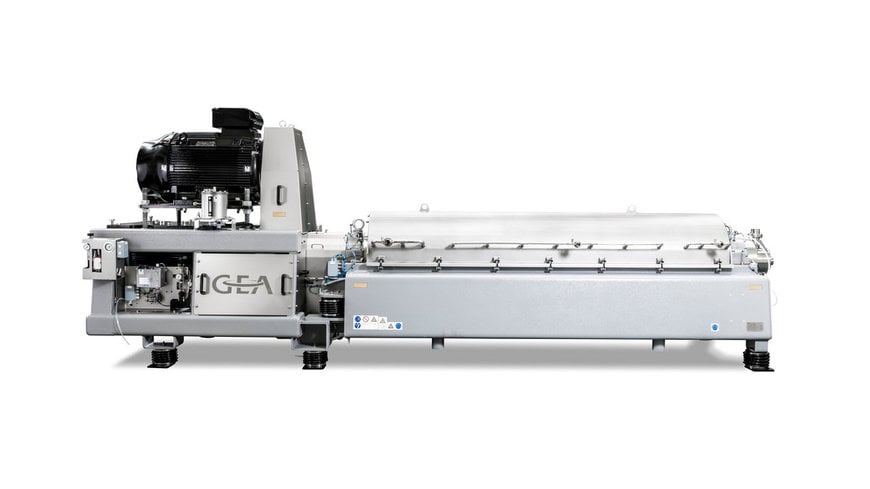www.magazine-industry-usa.com
29
'21
Written on Modified on
GEA SUPPLIES DECANTER FOR LEADING PAPER AND PACKAGING MANUFACTURER IN SOUTH ASIA
GEA delivers two CF 8000 decanters to ITC Paperboards and Specialty Papers Division in Bhadrachalam, India. The GEA decanters will support ITC’s modernization and new construction project.

The Paperboards and Specialty Papers Division of ITC is the leading company in the paper and board industry in South Asia. Modern recovery boilers are being installed at the site to improve the ash handling process. Two new CF 8000 decanters from GEA are key components of the ash leaching stage of a modern Chemical Recovery Boiler
The modern chemical recovery boilers are not only an integral part of the pulp recovery process, but also generate electricity and steam for the entire mill. This project is being carried out by Valmet, the world's leading developer and supplier of process technologies, automation and services for the pulp, paper and energy industries. Valmet, in turn, had contracted GEA to supply the CF 8000 decanters as part of this overall project.
GEA decanter CF 8000 as immediate and later as long-term solution
GEA has already delivered the two CF 8000 decanters. They were initially installed in a first step to support the three existing, old recovery boilers. When the new boiler is ready, the ash leaching system including the two CF 8000 decanters will be connected to it. The installation of the GEA decanters that has taken place so far is therefore initially an interim solution, but one that will allow ITC to continue production without disruption and without interruption.
GEA with many years of expertise in decanters and electrostatic precipitators
The decanters were developed by GEA, the world's leading German specialist in centrifuge technology. The technology is based on decades of GEA's market-leading expertise in the chemical sector, with which pioneering processes and technologies for suspension treatment are continuously developed. The high energy efficiency, trouble-free operation, good clarification and dewatering performance, high degree of standardization, modular, compact design, easy integration into established processes with little need for adaptation, and fast delivery time are the key advantages.
Information about the technical background of the project
GEA has developed the Flat Pond 6° decanters specifically for clarification and dewatering in chemical and mineral processes. The decanters are made of duplex steel. A special property of duplex steel is its high corrosion resistance, for example against surface corrosion, localized corrosion, pitting corrosion and stress corrosion cracking. Due to the high drum speed, solids settle on the inner drum wall and are continuously discharged by the built-in screw conveyor. Due to the comparatively large solids discharge diameter, the 6° shallow pond design results in a significantly higher dry solids content in the solids discharge and thus a high G-force at this point.
The decanter centrifuge has special rinsing equipment so that no application-typical solids deposits can form on the solids catcher, in the bowl, on the bowl shell and in the discharge. The entire project consists of the Valmet recovery boiler, the "Valmet AshLeach Duo" and the electrostatic precipitators (ESP). Electrically charged ionic compounds (chlorine, potassium, sodium, sulfates, carbonates) are collected by the electrostatic precipitator from the combustion process, fed into the ash leaching system and mixed with hot water. The valuable ions, such as sodium and sulfate, are returned to the process by the decanters, while undesirable ionic compounds, such as chlorine and potassium, are removed. The ash leaching process helps prevent corrosion in the expensive recovery boiler and reduces deposits in the chemical recovery boiler. Corrosion of the boiler would result in immense repair costs. Deposits in the chemical recovery boiler lead to a significant reduction in steam and energy yield.
CF Decanter from GEA as a Game-Changer for Modern Chemical Recovery Boilers
Black liquor is the name for a residue left over from the chemical pulping process. This residue contains not only wood by-products, but also chemicals used in pulp production. The mixture is usually concentrated in an evaporator and then burned in the recovery boiler. The heat generated by this combustion is used to produce steam. The steam is used in the chemical pulping process and in paper production. The excess steam is converted into electrical energy in the turbines.
Ash treatment and ash leaching
Ash produced during combustion in the Chemical Recovery Boiler contains high levels of potassium and chloride. These chlorides increase the risk of corrosion in many parts of the recovery boiler. The potassium also makes the ash sticky, causing it to adhere to internal boiler surfaces and significantly reducing energy efficiency. These problems can be avoided by using appropriate ash treatment systems such as the one used at ITC with the GEA decanters.
Valmet
Valmet is the world's leading developer and supplier of process technologies, automation, and services for the pulp, paper, and energy industries. Valmet's technology offering includes pulp mills, tissue, board and paper production lines, and power plants for bioenergy production. Valmet's services and automation solutions improve the reliability and performance of customers' processes and increase the effective use of raw materials and energy. Valmet's headquarters are located in Espoo, Finland.
www.gea.com

